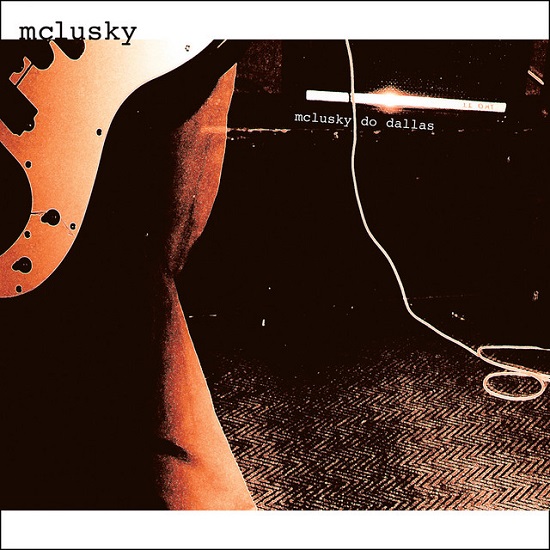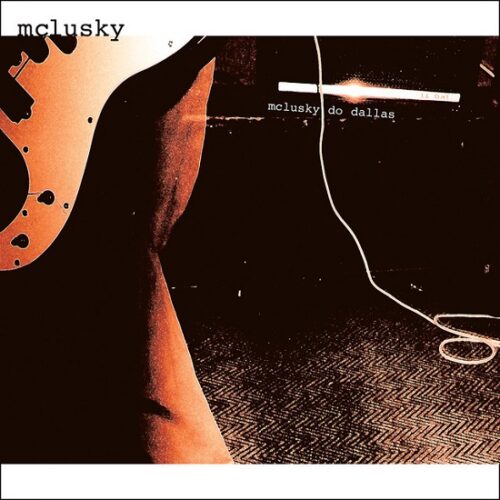Like the pornographic movie Mclusky pay titular tribute to, Mclusky Do Dallas was a word-of-mouth affair; an illicit noise, spoken about in whispers, taped onto C90s or burnt onto compact discs and passed around, as music often was back then. I received my first copy on a CDR from a lad called Todd, before shelling out for the real thing from the local record emporium in Camden in 2002. The inlay card informed me that Do Dallas was on the label Too Pure, which didn’t mean much to me at the time, and was produced by Steve Albini, who I had heard of.
Todd also told me that Mclusky came from Cardiff and that was about all I knew. The dearth of column inches at the time might have added to the mystery, but it was frustrating not being informed about a band making such a startling noise. I began to see it as a moral failing that the New Musical Express hadn’t gone to bat for them. This was the kind of music that you might have reasonably expected the UK’s biggest music publication to cover in earlier times – certainly when I was a teenager in the late 80s and early 90s.
By rights, Do Dallas should have been a bread and butter proposition for the NME, for whom the advent of the Beatles and the Stones saw their focus switch to guitar-based rock, a line of attack it’s followed broadly ever since. Mclusky had the propulsive energy of post-hardcore bands like The Jesus Lizard and the surreality of The Bonzo Dog Doo-Dah Band, while frontman and firebrand Andy Falkous wrapped the sardonic delivery of Stewart Lee in the violent self-debasement of Antonin Artaud. Mclusky’s music is atavistic yet brainy, and offensive in that expletive-driven way that’s de rigueur for rock fans in their twenties (but slightly wince-inducing now if you have small children).
To say nothing had prepared me for the deluge of guitar noise would be a lie – this was 2002 after all, where every two-bit E1 guttersnipe was plugging themselves into an Orange combo and making an unearthly din – but it was obvious from just a few bars of ‘Lightsabre Cocksucking Blues’ that these irascible, Dadaist, wisenheimer Welshmen definitely didn’t form after hearing The Modern Age EP by the Strokes.
Do Dallas is cut through with feral noise: the Pixies-like hardcore gabble of ‘No New Wave No Fun’ and ‘Dethink To Survive’, the buzzsaw, fuzz-bass propelled groove of ‘To Hell With Good Intentions’, the beautifully self-defeating ‘Fuck This Band’ and, perhaps best of all, the two-minute knockabout scuzz-punk anthem ‘Gareth Brown Says’ about a lying div from school, which starts with the immortal lines: “All your friends are cunts / Your mother is a ballpoint pen thief”.
Their absence from NME was a mystery to me. It would transpire that one man was responsible for this media blackout. Under the editorship of Conor McNicholas, there had been a two-tier system imposed. The New Rock Revolution featured desirable bands who met certain aesthetic prerequisites, sporting the correct regulated shoulder length hair, skinny suits, high cheekbones and pork pie hats. Bands such as The D4 and Radio 4 were so utterly etiolated and devoid of identity that even they can’t remember what they looked or sounded like now.
Those groups that didn’t fit the editor’s facile imperatives were demoted to the graveyard they half-arsedly called ‘The Scene With No Name’. Mclusky’s velvet fist in an iron glove approach to their art was too complex for McNicholas, and it didn’t help that they looked like extras from Scum. Come the New Rock Revolution, Mclusky would not be first against the wall being snapped by Anton Corbijn.
McNicholas edited the NME between 2002 and 2009 where he famously got into an expensive tussle with Morrissey about the singer’s antiquated views on race, before wandering off to concentrate on motoring and NFTs. By the time he left the organ, its reputation was in the bin. Opinions vary however, and when asked by the Independent in 2008 whether he considered himself successful or not, McNicholas equated what he was doing with everything ever written by the Bard of Avon: “I couldn’t hold this position for so long and not be [successful],” he said. “Before NME I’d worked on small title magazines and when I’d tell my mum I had a new job she’d say, ‘That’s nice, I’ll look out for it on the newsstands,’ which meant she had no idea what I was talking about. When I told her about the NME job she said, ‘That’s like editing the Complete Works of Shakespeare,’ because it’s such an iconic brand.”
For some bands, McNicholas was anointing them with the finger of history, for others it would only mean tragedy. The New Rock Revolutionaries got a special CD mounted onto the magazine in November 2002, including The Libertines, The Von Bondies, The Datsuns, The Music, The Coral, and a concessionary place for Ikara Colt, a fiercely rhythmical Fall-like phantasm who got a free pass because a couple of them could have passed for Uniqlo models.
The No Namers on the other hand got half a page on 20 April. These undesirables were huddled together like a gallery for degenerate art for an article entitled: “No Name: We Name Names”. Mclusky were lined up alongside Brighton’s hairy, scary the Eighties Matchbox B-line Disaster, another eccentric band of brilliant incandescence who were much too hot for a title that had now become known as “the Indie Heat”. Then came Miss Black America, This Girl, The Moonies, Moco and HoggBoy; bands you could file under “Where are they now?” or even “Who were they then?”. Most confusingly, the Cooper Temple Clause were also listed, and yet they somehow managed to escape No Name and join the New Rock Revolution just in time for the pre-Christmas covermount.
Mclusky wouldn’t be so lucky: “Veterans of the SCREAMINGBLOODYFASTANDLOUDABOUTEVERYTHINGcore scene, Cardiff’s McLusky were No Name before No Name was invented thanks to delightfully titled ditties such as ‘Lightsaber Cocksucking Blues’, ‘Fuck This Band’ and another dozen ditties that sound like the Ramones falling down the stairs,” read the piecemeal, hurriedly-written blurb under a tiny photo. “If the Ikara Colt album had been recorded on top of a washing machine on fast spin, it’d be McLusky’s McLusky Do Dallas. McLusky Do Dallas – yup, that’s brilliant. ‘We take more drugs than a touring funk band… and we’re all going straight to hell!’, they claim. Any bunks spare?” And with that, NME had done its bit.
Mark Beaumont had apparently attempted to include The Libertines amongst these groups to give the scene some weight, but a veto came from on high: “Many attempts were made at naming the fervid torrent of guitar bands playing ‘guerrilla gigs’ in vests freshly dipped in the sop trays of Filthy McNasty’s,” he wrote in a 2018 blog. “The Scene With No Name (guilty) stumbled at the first hurdle, when our editors didn’t let us include The Libertines amongst the Eighties Matchboxes and Cooper Temple Clauses kicking up an early-‘00s storm.”
The ‘scene’ itself was a construct of course, like they all are. Such bands lumped together have little to do with each other, unless they happen to share the same bills, but joining the dots is a magazine’s prerogative no matter how tenuous it all might appear to be. But No Name was code for the excluded, the bands they didn’t know what to do with and didn’t have the imagination to promote properly. These groups had been relegated before a ball had even been kicked. They’d been discriminated against because they were too interesting. Cultural vandalism by any other name.
20 years on, Mclusky Do Dallas has become a cult classic in spite of NME, while Falkous continues to deliver prolifically via his Christian Fitness Bandcamp page, continuing to put product out into the world long after NME retreated online. As for McNicholas, he trashed the brand and sent it into terminal decline before failing upwards, landing a plum job editing Top Gear. Admittedly, he steadied the ship for a few years in the early part of his tenure, though readers soon tired of the lack of alternatives from a magazine that had prided itself on its alternative music coverage for many decades.
“My job is to deliver ABC increases and not declines, but I’ve had a challenging year,” he said in 2007, before coming up with a barrage of excuses. In his last six months he presided over two relaunches of the magazine as sales figures fell by another 25%. New editor Krissi Murison did her best to resuscitate the magazine by focusing it back on a wide spectrum of music again, but by then the damage had been done. Like the pornographic movie Mclusky pay titular tribute to, the NME had been fucked.





